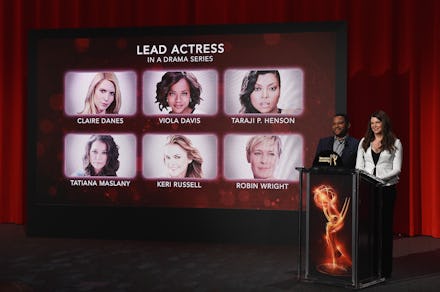#EmmysSoWhite Didn't Happen — And It's All Because of Opportunity

As she accepted the Emmy for best actress in a drama series in September, How to Get Away With Murder star Viola Davis stopped the show. She opened with a paraphrased quote from Harriet Tubman: "In my mind, I see a line," she said. "And over that line, I see green fields and lovely flowers and beautiful white women with their arms stretched out to me over that line. But I can't seem to get there no-how. I can't seem to get over that line."
As the first black actress to win best actress in a drama Emmy, Davis took the opportunity to make a potent point: "The only thing that separates women of color from anyone else is opportunity."
Unlike the film industry, which continues to drag its feet on inclusion despite being proven as a better business practice that makes more money, television networks get it. Over at Fusion, Dodai Stewart pointed out what a godsend TV was in the wake of #OscarsSoWhite. "Studies show that women and people of color love movies, but the movie industry is ignoring them," she wrote. "Would people rather curl up with some excellent, inclusive TV instead?"
Look at the comedies: There's Black-ish, with its stars Anthony Anderson and Tracee Ellis Ross. There's Jane the Virgin and star Gina Rodriguez. There's Fresh Off the Boat and star Constance Wu. Look at limited series: Consider shows like American Crime and American Crime Story: The People vs. O.J. Simpson in limited series. Look at dramas: There's Orange Is the New Black, How to Get Away With Murder and Empire. I'm just scratching the surface here, and I've already named more shows and performers than Oscar voters had to choose from in all of film last year.
Put simply, the Emmys turn out a more diverse slate because they have a more diverse group of potential nominees — and that is because television gets it.
Out of the 98 acting Emmy nominees this year, 20 are actors of color. They make up just over 20% of the nominees. This is slightly down from last year, when 25% of all acting nominees were actors of color, as noted by Vulture, but still a healthy percentage.
The Emmys more closely resemble the Tonys than the Oscars at this point. Both the Emmys and Tonys found plenty of room to highlight performers of color and stories about nonwhite characters. Oscar voters, meanwhile, turned in an all-white slate of nominees for the second year in a row. The only way black films earned recognition was for their white talent.
#OscarsSoWhite 2.0 became a public relations catastrophe that spurred sweeping changes in how the Academy of Motion Picture Arts and Sciences recruits new members. Yet the biggest reason why the Oscars slate turned out so much more monochrome than the Emmys is about exactly what Davis was talking about on the Emmys stage last year: opportunity.
True, Oscar voters did ignore several potential nominees of color — but there weren't that many actors to choose from. Oscar-worthy movies that featured nonwhite characters last year were few and far between. At most, the Oscars could have nominated two or three: Michael B. Jordan and Tessa Thompson from Creed, for instance, or Idris Elba for Beasts of No Nation. Out of 20 total nominees, that's still a drop in the bucket. It's not really addressing the problem, because are still fewer characters of color in the most award-worthy movies.
To paraphrase Davis, the only thing that separates actors of color from anyone else is opportunity. And actors of color received a ton of opportunities on TV this past year.
This isn't meant to minimize the work done by the fantastic performers of color nominated for Emmys this year; they all more than earned their spots. But unfortunately, being worthy hasn't always been enough to get recognized — ask Ava DuVernay or David Oyelowo, both snubbed for Selma by the Oscars in 2014. But this year's 20 actors of color deserve kudos: They took their opportunities and turned out fantastic work that the Television Academy deemed worthy of recognition.
So cheer for #EmmysSoDiverse, yes, but heed Davis' words: "You can't win an Emmy for roles that are simply not there." Finally, TV is giving performers those roles. Now, it's time for Hollywood to do the same for film.
Read more: